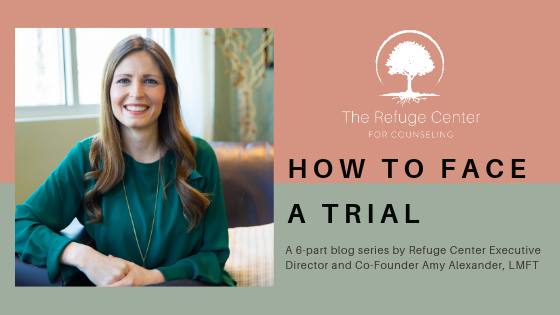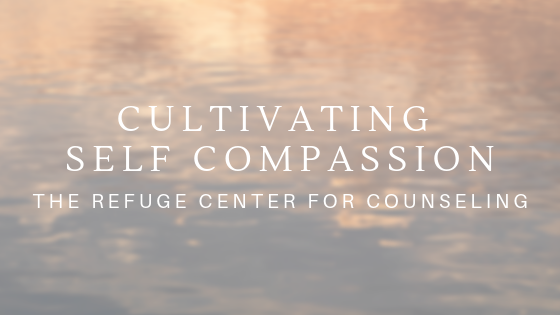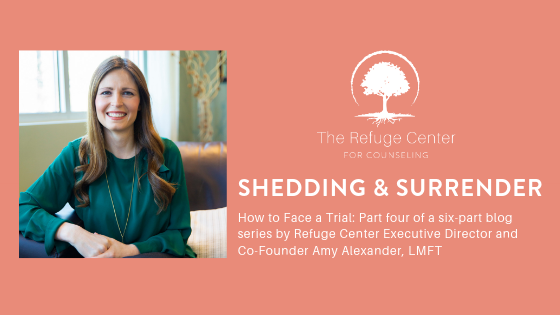Part one in a six-part blog series by Refuge Center Executive Director and Co-Founder Amy Alexander, LMFT
I have a sign that hangs in my office on the wall that clients face during their sessions. It has just one word on it: BRAVE.
To be brave is to face and endure pain with courage. It does not mean we are not afraid. It means that we know there is something greater than our fear. That “something” is the possibility of transformation. Pain, crisis and trial always hold the capacity for new life to be birthed in and through us. This is an active process, a pilgrimage to our true self and our most authentic connection with Christ.
One of the bravest and wisest things we can do in the midst of a trial is to discover, acknowledge and feel our feelings.
Our emotions can offer us gifts such as empowerment, connection and discernment. We may not want to feel our feelings when we are in pain. We fear they will cause even more pain. And yet, we can have confidence in their ability to communicate important information to us.
We might imagine our emotions as “little messengers” who have come to share something of note.
We can listen to the messages with kindness, compassion and curiosity and then, more fully informed, determine what course of action to take.
I first heard the term “radical inner hospitality” from the author, Christine Valters Paintner. She explains, “We are each a multitude of differing energies and personalities. We contain parts that feel tender and ashamed, alongside the courageous and fierce, the joyful and giddy. It often feels easier to simply push the voices away, but it is exhausting. A lot of our inner conflict comes from our stubborn refusal to make space for the multiplicity we contain……You are a multitude. Welcome in all of you.” (2016, p.xv-xiv)
The welcoming she is referring to is essentially extending a curious and compassionate presence to our many parts.
Paintner names some of our parts- the inner judge, the inner warrior, the inner lover, the inner orphan, etc. She says, “Hospitality is key. Welcoming in the stranger, even if that stranger is me, or at least parts of me.” (2016, p.xv-xvi)
As I have studied these ideas further, through the writings of Paintner, Richard Schwartz, Mary Steege, and others, my worldview has shifted. My prior worldview was that feelings can’t be trusted, they can “lead us astray” and we must turn away from emotion to be able to turn towards “truth.”
This idea of inner hospitality truly is radical. Each part of me is a gift, a guide. It has something to teach me. When I am connected to my true self and to the Holy Spirit I am able to get to know these parts without being afraid of them and without shunning them.
I once heard someone say that when we ignore our feelings, they don’t go away- they just “go into the basement and lift weights and come out stronger.” Amusing imagery, but true.
How might our emotions come out stronger if not acknowledged? Perhaps through depression, confusion, anxiety, insomnia, stomach aches etc. Emotions carry so much energy! Our emotions and thoughts need to be attended to.
Next time you noticed a strong emotion surfacing (perhaps shame, anger, grief, etc.) what would it be like to imagine it as a guest knocking on your door and bearing an important message for you?
What would it be like to invite that feeling/part of you in and listen closely to its message, without needing to critique, analyze or “fix” it? But rather, just noticing and perceiving the wisdom or needs that are presented.
Your true self, with the help of the Holy Spirit, can serve as that wise and observing Innkeeper that offers safety and respite for a weary, conflicted or joyful part of you.
For me, this gives fresh meaning to the scripture, “Come to me, all you who are weary and burdened, and I will give you rest.” Matthew 11:28-30, New Internation Version. Jesus is the perfect example of this gracious Innkeeper and He can help us offer this radical inner hospitality to ourselves.
You might decide to practice this
A Journey
For a moment, imagine you have been traveling on a long journey.
Your journey has been rich and fulfilling, but at times, also challenging and painful.
You are now at a point in the journey where you have slowed to a place of reflection and realize that all your experiences have led to a mix of many powerful emotions- such as gratitude, fear, determination, loneliness, and hope.
Feeling a bit weary, you decide to stay the night at an inn. Upon reaching the inn, you see a sign above the front door that reads, “Come to me, all you who are weary and burdened, and I will give you rest.” Matthew 11:28-30
Below that, a smaller sign reads, “ALL PARTS WELCOME.” Intrigued, you knock on the door.
The Innkeeper greets you and ushers you into a space of warmth and light.
You find yourself breathing a bit deeper and notice you are feeling welcomed, safe, and calm.
The Innkeeper invites you to relax in a large, comfortable chair and prepares you a cup of tea.
While doing so, the Innkeeper asks about your journey.
Though you just met the Innkeeper you feel at ease in sharing about experiences.
As you share about the trials and victories of your experiences and the many emotions you are having, you note that the Innkeeper offers a calm, compassionate presence.
The Innkeeper is genuinely curious to know your stories. You share openly and deeply about the challenges, losses, triumphs, and accomplishments you have experienced on your journey. And you are met with kindness, grace, and comfort.
After a time of sharing and reflecting, you have a sense of connection with the Innkeeper and more clarity about your journey.
You have a growing sense of confidence and an awareness of the courage it truly took to make this journey.
You also have a great appreciation for this Inn and its Keeper.
For here, you were able to reveal your thoughts and feelings and they were all welcome.
For the past several years, I have met monthly with a Spiritual Director.
Christian Spiritual Direction is the ancient practice of listening with another for the voice and movement of God in one’s life.
It offers companionship in the most important, intimate area of one’s life, exploring the inner landscape where one receives and responds to the God who is Love. In this process, it is my goal to be listening for God’s intentions for my life.
At times, my Spiritual Director has been like the Innkeeper for me along my journey. She provides space for me to lean into the myriad of feelings, questions, and ideas I have and greets them with compassion and curiosity. Gently and lovingly she listens to my concerns and with compassionate inquiry asks me where I am finding Jesus in my trials. She does not claim to have the “right” answers for me or assign judgment to my feelings- she accepts me right where I am.
In order to voice our feelings, we need a language to do so. There are many names for our feelings. Chip Dodd, founder of Sage Hill and author of Voice of the Heart, identifies eight healthy core emotions that give us insight. He shares that:
Anger is the emotion that tells you are feeling other emotions and the emotion that empowers you to stand up for what you believe to be true.
Fear is the emotion that lets you know you are in danger and triggers your fight or flight response.
Hurt is our ability to love someone and be disappointed by them.
Sadness tells you that you honor, value, or respect someone or something and that you feel a sense of loss when it is missing.
Loneliness is your ability to be connected to someone or some group and not be able to connect for whatever reason.
Shame is the emotion that tells you that you should or should not be doing something.
Guilt is your internal barometer of right and wrong. It tells you when you have done something wrong based on your values and beliefs.
Glad is feeling a sense of joy, peace, and happiness about some thing or someone (2014).
We might consider a daily “check-in” with our emotions, naming which of the above eight we are experiencing at a given time. Guided imagery, mindfulness exercises and centering prayer are also great ways to tap into our feelings.
Being able to access and acknowledge our feelings is empowering and transformative. Leaning in to our emotions can feel scary, especially when we are facing a storm, but the rewards are rich and lasting.




